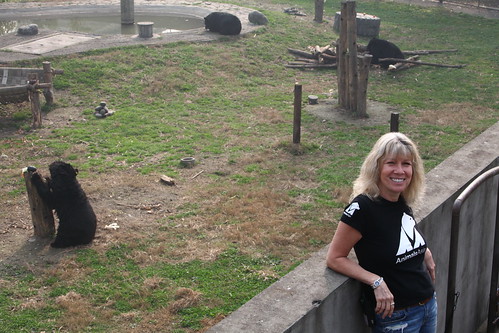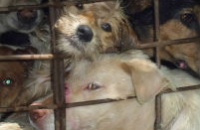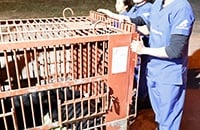Winter Olympics 2018 “moon bear” mascot is a major milestone in the campaign to end bear bile farming
06 June 2016
Animals Asia has welcomed the announcement of Pyeongchang 2018 Winter Olympics’ moon bear mascot, saying it will help thousands of moon bears on bile farms across Asia.
Two mascots, including moon bear “Bandabi”, were unveiled this week in Pyeongchang, South Korea in a presentation to the International Olympic Committee (IOC) Executive Board.
White tiger “Soohorang”, and Bandabi, will represent the Olympic and Paralympic winter games respectively.
Bear bile farming has been effectively illegal since 1992 in South Korea but it’s believed that over 1,100 bears, mainly moon bears, are still on farms. Many farmers remain hopeful the practice will once more be legalised, and a black market for local bear bile and whole gall bladders continues to exist in South Korea.
In addition, South Korean tourists still visit China and Vietnam in large numbers to visit bear farms and buy bear bile. As recently as 2012, it was reported that 300,000 South Korean tourists visit bear bile farms in China each year. Around 30 percent of these purchase bear bile and bring it back to South Korea, despite this import being illegal.
Animals Asia has also run an extensive campaign in Halong Bay, Vietnam - a favourite among South Korean tourists - reminding local tourist workers and holidaymakers that bear bile farming is illegal in Vietnam. Last year the campaign’s success saw local Quang Ninh officials finally give the go-ahead for Animals Asia to rescue all the remaining bears and end bile farming in the province.
Animals Asia founder Jill Robinson said:
“Despite the illegality of bear bile farming in South Korea, the country continues to be a significant purchaser of bile products and with 1,100 bears still caged - the battle to end this cruelty is far from over. However, we believe this announcement is a major milestone for the species. It would be unthinkable to have an animal represent the country internationally in this way while they continue to suffer.”
The at-risk moon bear, or Asiatic black bear, has not always had the same profile that other bear species have enjoyed - even among conservationists. Animals Asia founder Jill Robinson is widely regarded as being responsible for bringing the sheer scale of bear bile farming in Asia to international audiences following a trip to a bear farm in 1993.
Jill Robinson added:
“Today in Vietnam we are seeing the market for bear bile crashing and the industry winding down. In China the country’s largest producer of bear bile has joined forces with the authorities to find an acceptable alternative.
“With Bandabi as a mascot in South Korea, there is a cute factor in exposing cruelty. If you can get people to see animals as more than a resource then they will question the cruel treatment of farmed bears. We believe Bandabi will have an impact across Asia and the world, and remind people during the Winter Olympics of the many bears that are still suffering and caged. “
Thousands of bears are still caged on bile farms in Asia and face regular painful bile extractions for use in traditional medicine. In China alone, over 10,000 bears are still on farms. Animals Asia have rescued nearly 600 bears from the bile industry and continue to care for nearly 400 in sanctuaries in China and Vietnam.
BACK





 5 reasons the dog meat trade must end
5 reasons the dog meat trade must end
 New year, new home for Christmas the Bear!
New year, new home for Christmas the Bear!
 Veterinary welfare training – pain management
Veterinary welfare training – pain management